Tencel vs. Bamboo: Which Is Better and When to Use
When comparing Tencel and bamboo fabrics, it’s essential to consider their unique properties and environmental impacts. Tencel, known for its softness and durability, is produced through a sustainable closed-loop process, making it a more eco-friendly choice. In contrast, bamboo offers natural antibacterial qualities and requires fewer pesticides, making it beneficial for specific applications. Understanding these differences can help you choose the right fabric for your needs.
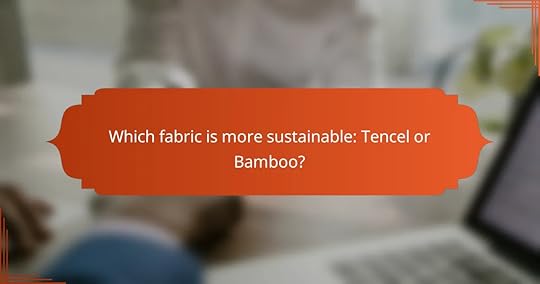
Tencel is generally considered more sustainable than bamboo due to its closed-loop production process, which minimizes waste and uses less water. However, bamboo has its own environmental benefits, such as requiring fewer pesticides and less water during growth.
Tencel is made from sustainably sourced wood pulpTencel, also known as lyocell, is derived from sustainably sourced wood pulp, primarily from eucalyptus trees. The production process involves dissolving the wood pulp in a non-toxic solvent, which is then recycled in a closed-loop system, significantly reducing environmental impact.
This method not only conserves resources but also ensures that the fibers are biodegradable. Brands that produce Tencel often adhere to strict sustainability standards, such as the Forest Stewardship Council (FSC) certification, which promotes responsible forest management.
Bamboo requires less water and pesticidesBamboo is known for its rapid growth and ability to thrive without the need for chemical pesticides or fertilizers. This makes it an attractive option for sustainable fabric production. Bamboo can grow in a variety of climates and typically requires less water compared to traditional cotton crops.
However, the sustainability of bamboo fabric can be compromised during processing. Many bamboo textiles undergo chemical treatments that can negate some of their environmental benefits. It���s essential to look for brands that utilize eco-friendly methods, such as mechanical processing, to maintain the sustainability of bamboo fabrics.
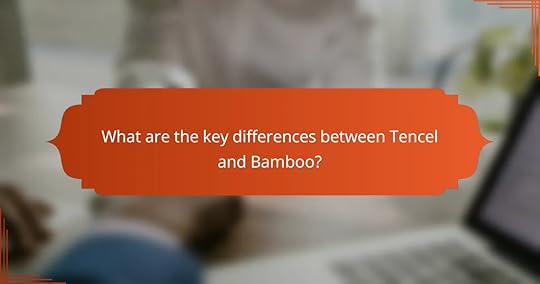
Tencel and bamboo fabrics differ primarily in their softness, durability, and natural properties. Tencel, a branded fiber made from sustainably sourced wood pulp, tends to be softer and more durable, while bamboo offers natural antibacterial qualities that can be beneficial for certain applications.
Tencel is softer and more durableTencel fibers are known for their exceptional softness, making them a popular choice for clothing and bedding. The manufacturing process involves a closed-loop system that recycles water and solvents, resulting in a smooth texture that feels luxurious against the skin.
Additionally, Tencel is more durable than bamboo, maintaining its strength even after multiple washes. This durability makes it suitable for items that require frequent laundering, such as activewear and sheets, where longevity is a priority.
Bamboo has natural antibacterial propertiesBamboo fabric is renowned for its natural antibacterial properties, which can help reduce odors and keep garments fresher for longer. This quality makes bamboo a great option for activewear and undergarments, where hygiene is essential.
Moreover, bamboo is highly absorbent and moisture-wicking, making it comfortable to wear in warm climates. However, it is generally less durable than Tencel, so while it offers unique benefits, it may not withstand heavy use as well as Tencel does.
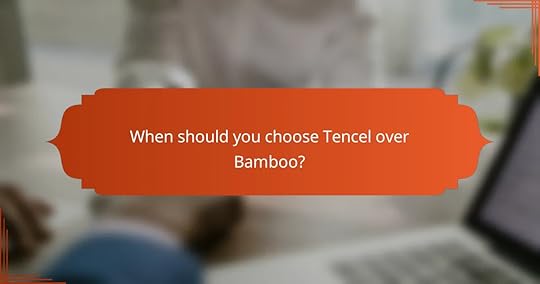
Choose Tencel when you prioritize softness, moisture-wicking properties, and eco-friendliness in your textiles. Tencel, made from sustainably sourced wood pulp, often outperforms bamboo in terms of comfort and environmental impact.
For luxury bedding and clothingTencel is an excellent choice for luxury bedding and clothing due to its silky texture and breathability. It drapes beautifully, making it ideal for high-end garments and sheets that feel soft against the skin.
Additionally, Tencel’s moisture-wicking abilities help regulate body temperature, enhancing comfort during sleep or wear. This makes it particularly suitable for those who seek a premium experience in their textiles.
When durability is a priorityWhen durability is essential, Tencel stands out for its strength compared to bamboo. Tencel fibers are less prone to fraying and fading, ensuring that your items last longer, even with regular use and washing.
Moreover, Tencel is resistant to wrinkles and static, making it a practical option for everyday wear. If you need fabrics that maintain their quality over time, Tencel is a reliable choice.
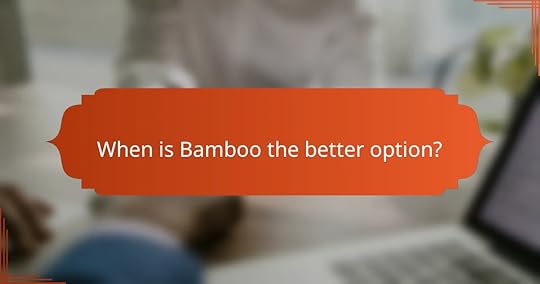
Bamboo is often the better choice when prioritizing eco-friendliness and affordability in fabric options. Its rapid growth and minimal pesticide use make it a sustainable resource, while its lower production costs can lead to more budget-friendly apparel.
For eco-friendly activewearBamboo fabric is an excellent option for eco-friendly activewear due to its natural properties and sustainable production methods. It is biodegradable, requires less water than cotton, and is often produced without harmful chemicals. This makes it a popular choice for environmentally conscious consumers looking for workout gear.
When selecting bamboo activewear, look for certifications like OEKO-TEX or GOTS to ensure the fabric meets environmental standards. Additionally, consider brands that emphasize sustainable practices in their manufacturing processes.
When seeking affordabilityBamboo textiles are typically more affordable than many alternatives, including Tencel, due to lower production costs and the abundance of bamboo as a raw material. This makes bamboo a practical choice for consumers who want quality without breaking the bank.
When shopping for bamboo clothing, compare prices across different retailers to find the best deals. Keep an eye out for sales or discounts, as bamboo products can often be found at competitive prices, especially in bulk purchases.
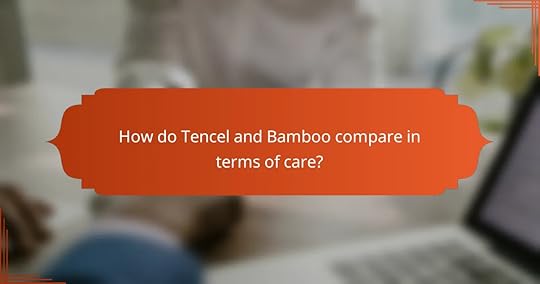
Tencel and bamboo fabrics have different care requirements that can affect their longevity and performance. Tencel is generally easier to care for, while bamboo may need more attention to maintain its quality.
Tencel is machine washable and quick-dryingTencel is machine washable, making it convenient for everyday use. It typically withstands regular washing cycles without losing its softness or structural integrity.
Additionally, Tencel dries quickly, which can be a significant advantage for those who need to wash and wear items frequently. This quick-drying property helps prevent mold and mildew, especially in humid environments.
Bamboo may require special washing instructionsBamboo fabrics often require more delicate care to preserve their natural fibers. It is advisable to wash bamboo items on a gentle cycle with cold water to avoid damage.
Some bamboo products may also need air drying rather than machine drying to maintain their shape and softness. Always check the care label for specific instructions, as improper washing can lead to shrinkage or loss of quality.
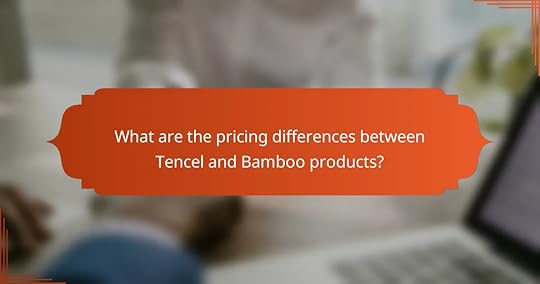
Tencel products typically cost more than bamboo products due to the more complex manufacturing process and the quality of the fibers. While both materials are eco-friendly, consumers should consider their budget and the intended use when choosing between them.
Tencel products tend to be more expensiveTencel, made from sustainably sourced wood pulp, involves a more intricate production process that contributes to its higher price point. Prices for Tencel items can range from moderate to high, often starting in the low tens of USD for basic products and going up significantly for luxury items.
When purchasing Tencel, consider the long-term value. Its durability and softness can justify the investment, especially for bedding and clothing that will be used frequently. Look for certifications like OEKO-TEX to ensure quality and sustainability.
Bamboo products are generally budget-friendlyBamboo products are often more affordable than Tencel, making them a popular choice for budget-conscious consumers. Prices for bamboo items can start as low as a few USD, which appeals to those looking for eco-friendly options without breaking the bank.
While bamboo is generally less expensive, it’s important to check the quality of the product. Some bamboo fabrics can be blended with other materials, which may affect their feel and durability. Look for 100% bamboo or high-quality blends to ensure you���re getting a good deal.
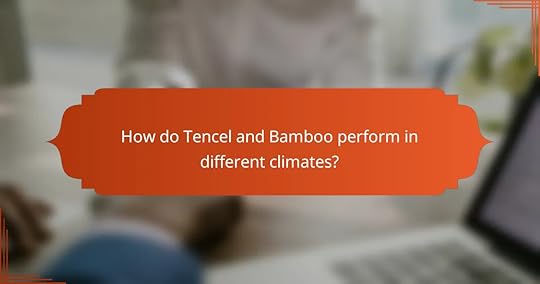
Tencel and bamboo fabrics have distinct properties that affect their performance in various climates. Tencel is known for its breathability and moisture-wicking abilities, making it suitable for humid conditions, while bamboo excels in providing a cooling effect during hot weather.
Tencel is breathable and moisture-wickingTencel, made from sustainably sourced wood pulp, is designed to be highly breathable. This quality allows air to circulate, helping to regulate body temperature and keep you comfortable in warm and humid environments.
Additionally, Tencel’s moisture-wicking properties draw sweat away from the skin, promoting quick evaporation. This feature is particularly beneficial for active individuals or those living in tropical climates, as it helps maintain dryness and comfort throughout the day.
Bamboo is cooler in hot weatherBamboo fabric is naturally cool to the touch, making it an excellent choice for hot weather. Its unique structure allows for better airflow, which can help lower body temperature during sweltering days.
Moreover, bamboo has inherent moisture-absorbing qualities, which means it can absorb sweat and moisture without feeling damp. This makes bamboo clothing a practical option for summer wear, especially in regions with high temperatures and humidity levels.
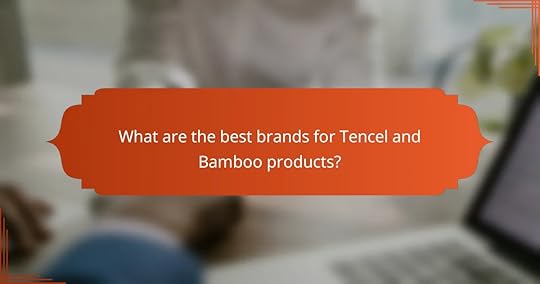
Some of the top brands for Tencel and Bamboo products include Lenzing, Eucalypso, and Boody. These brands are known for their quality materials, sustainable practices, and a range of products from bedding to clothing.
Top Tencel BrandsWhen looking for Tencel products, consider brands like Lenzing, which is the original manufacturer of Tencel fibers. Their products often feature high-quality sheets and clothing made from sustainably sourced wood pulp. Eucalypso is another notable brand, offering luxurious bedding that emphasizes comfort and eco-friendliness.
Top Bamboo BrandsFor bamboo products, Boody is a standout brand, known for its soft, breathable clothing made from organic bamboo. Another reputable option is Cariloha, which specializes in bamboo-based bedding and apparel, highlighting both sustainability and comfort. These brands often focus on eco-conscious practices while delivering quality products.
Factors to Consider When Choosing BrandsWhen selecting brands for Tencel or Bamboo products, consider factors such as sustainability certifications, product range, and customer reviews. Look for certifications like OEKO-TEX or FSC, which indicate responsible sourcing and manufacturing practices. Additionally, check for a variety of products that meet your specific needs, whether it���s clothing, bedding, or towels.
Price can also be a consideration; Tencel products may range from mid to high price points, while bamboo items can vary widely, often being more affordable. Always compare features and benefits to ensure you���re getting the best value for your investment.



